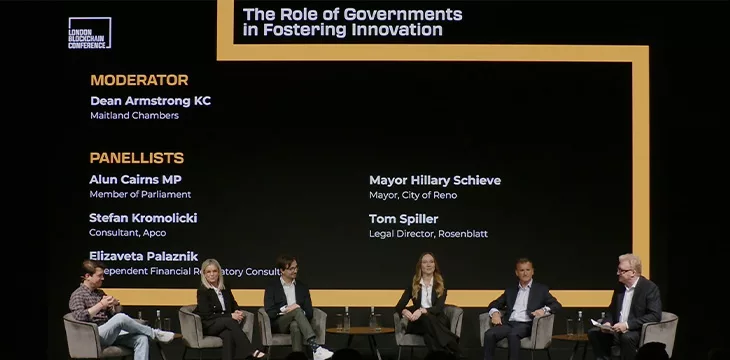|
Getting your Trinity Audio player ready...
|
The London Blockchain Conference 2024 gathered politicians from both sides of the pond to its panel on The Role of Governments in Fostering Innovation. The panel posed the question: Can effective policymaking and government intervention serve as a catalyst for growth and societal progress, or should the market be entrusted to determine its own destiny?
The panel was moderated by Dean Armstrong KC, from the London firm of Maitland Chambers. Armstrong’s request for a status report on the United Kingdom government’s digital asset perspective came from Alun Cairns, a Tory MP and vice-chair of the British Blockchain Association.
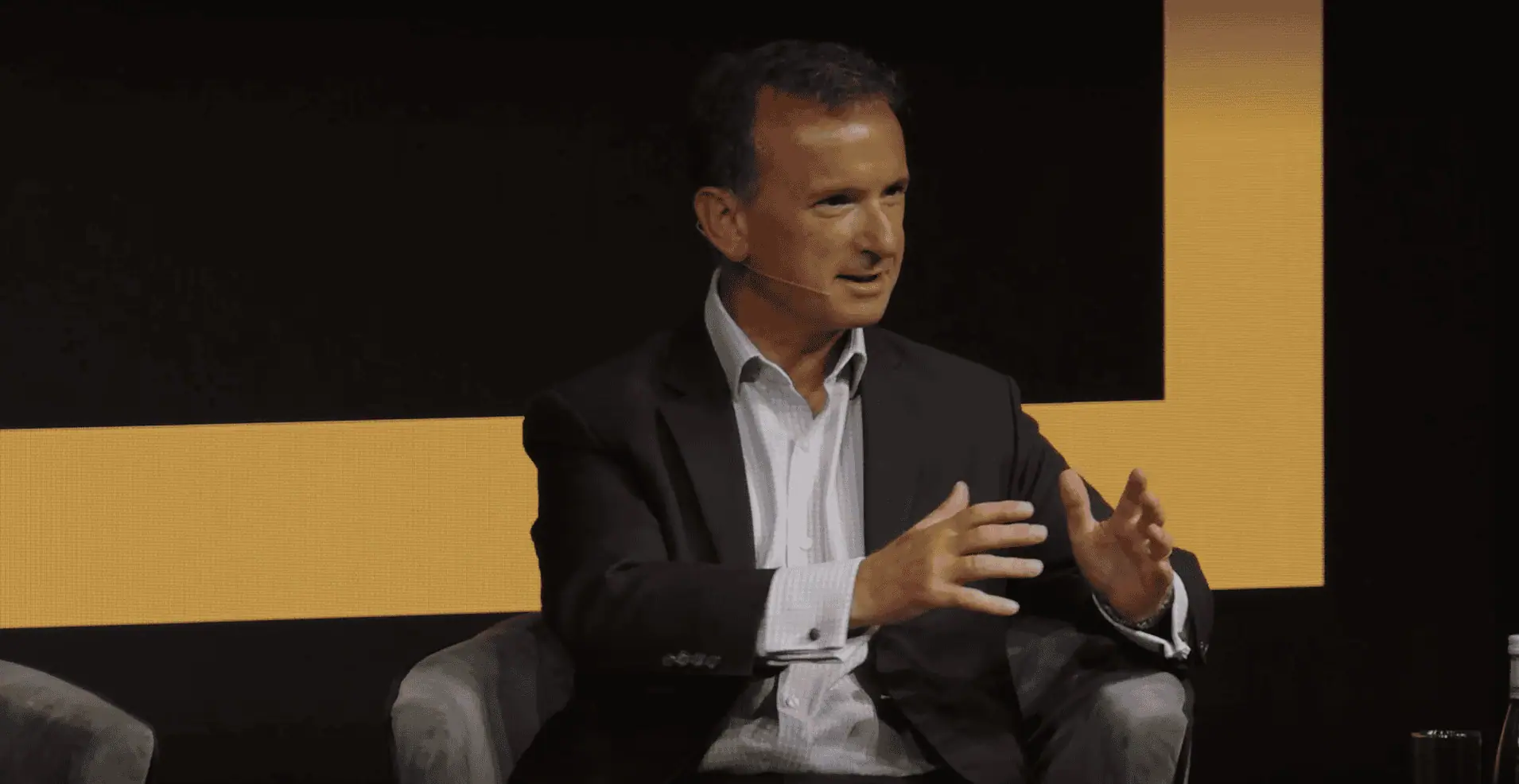
Cairns said there were only “a tiny number” of MPs who understand blockchain, with most of Parliament immediately equating blockchain with less savory elements such as cryptocurrencies, the dark web and such. Cairns called this “an understanding challenge” rather than a ‘branding’ issue but emphasized the “collective challenge” facing the blockchain community to “differentiate cryptocurrencies from blockchain and highlight what blockchain does to improve policy outcomes.”
Cairns sees his role in this challenge as “focusing on discrete areas of policy that can be transformational.” Cairns cited the notoriously “inefficient, expensive, cumbersome, inaccurate process” of land transfers as “probably the ripest fruit to pick off,” in part because it’s run by one primary agency.
Adding blockchain technology to land transfer “would without question make it much more efficient” while also preventing “so much fraud, so much risk.” Adding blockchain to this process “could almost be rolled out on a pilot basis, or a regional basis. That would give confidence to policymakers, regulators and civil servants,” not to mention public users.
Cairns stressed that the sector needs to target areas “where blockchain could make a difference and bring about change in a positive way, so people could understand what it does without worrying about the tech behind it.” Once that hurdle has been cleared, “the opportunities are limitless.”
Spiller alert
Armstrong then queried Tom Spiller, Legal Director at the Rosenblatt law firm in the U.K., which advises blockchain businesses on how to stay within legal boundaries.

Spiller said “the main differentiating factor” in views on blockchain “is likely to be geography.” While individuals in countries such as Argentina and Turkey might view digital assets as “a means of resolving market or state failure,” other countries see a cost-effective remittance channel while still others see it purely as a speculative endeavor.
And then there are countries that “just don’t want it,” like China and Nigeria. Spiller claims governments in these countries “singularly fail to understand that the reason why blockchain is popular is because of them.” Governments in countries like America took a dislike to digital assets because their first experiences were “very negative,” based on dark web markets like Silk Road and digital assets’ popularity with rogue regimes (North Korea) and terrorists.
In Spiller’s view, Japan’s approach is the most interesting. Starting with the Mt. Gox scandal, in which large numbers of Japanese customers lost loads of money, Spiller says it would have been very easy for Japan’s government “to bring down the shutters and say ‘no, we’re going to ban it, Tulip mania, people having their money stolen by slick snake-oil salesmen.’”
Instead, Japan “engaged with what they saw as the sophisticated part of their domestic industry, said there will be a licensing regime, and if some of you aren’t able to come up to this sufficient standards we require for our citizens, you will be out of business. At the same time, they did something radical, they recognized Bitcoin in particular as legal tender.” This “radical” carrot-and-stick approach has “paid them dividends.”
Spiller contrasted Japan’s approach to disaster with South Korea’s, which in the wake of multiple scandals imposed a strict regime that saw them go from “a booming ecosystem of around 50 exchanges down to five.” Spiller didn’t spare his home market, noting that the UK at one time had “literally hundreds of companies active in this space” but were now down to cohort of just over 30.
Armstrong contrasted this scattershot approach to how governments around the world have adopted a more uniform approach to newer technologies such as artificial intelligence (AI). Spiller said blockchain’s problem was that it “existed in a total vacuum, so regulators didn’t have to interact with it until there was a problem.” The varying blockchain experiences “arose in different social contexts and resulted in this enormous variance.”
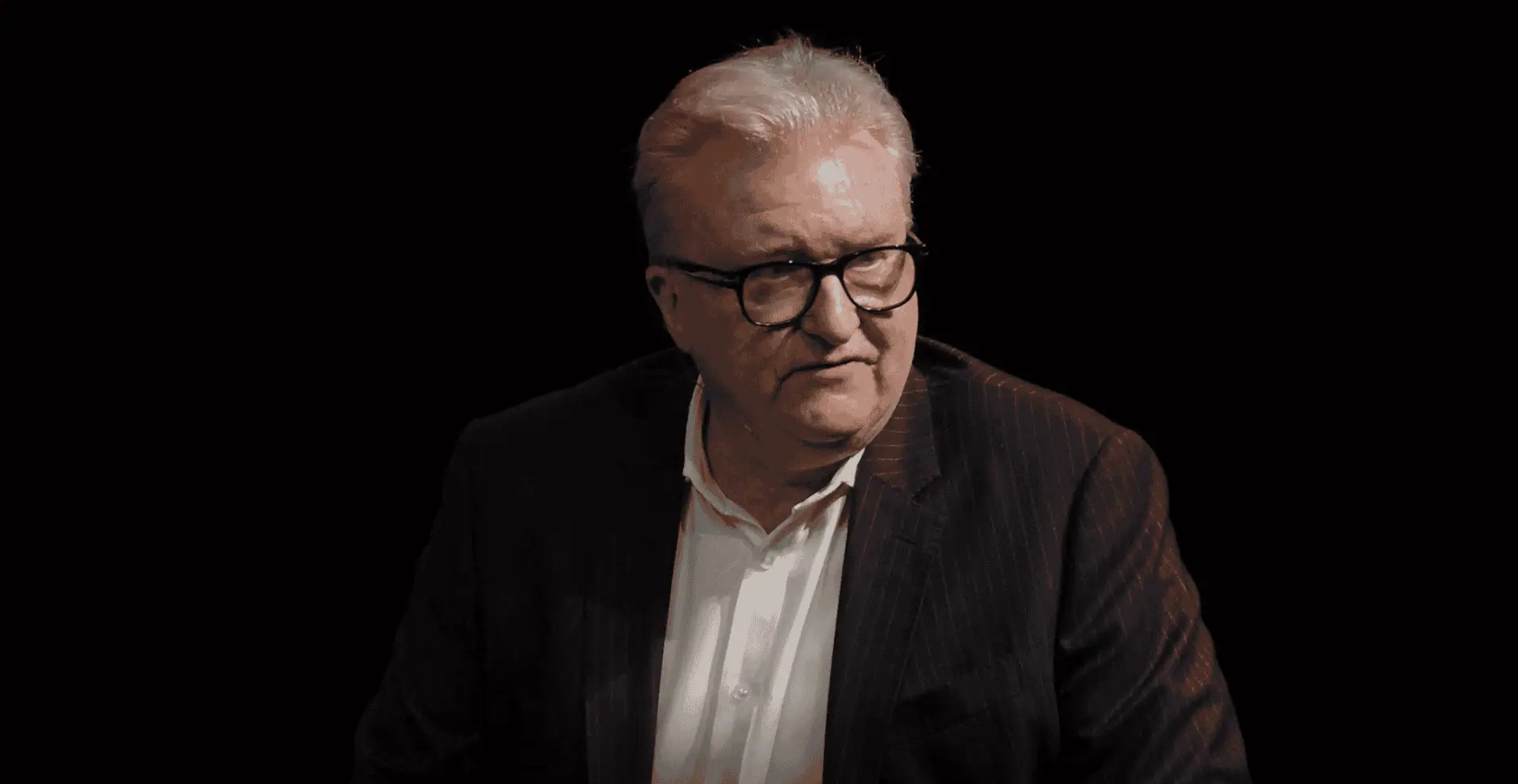
Try, try, trilemma again
Next up was Elizaveta Palaznik, a Brussels-based financial regulatory consultant. Palaznik described what she called ‘the blockchain trilemma,’ aka firms need to find a ‘sweet spot’ between decentralization, security and scalability. This was difficult to achieve because, for example, firms that want scalability generally have to compromise their current stance on decentralization.
Palaznik said the challenge is particularly acute for smaller firms, which might have a single individual tasked with ensuring compliance. These companies tell her that if they need “to spend as much money as a giant like Binance, we won’t survive.” She tells firms that the costs “should be proportionate to their systemic risk,” but blockchain minnows should nonetheless “show the regulator you’re in good faith” and at least “start the process of being compliant.”

Regulators face their own trilemma; the need to “stop bad actors and protect consumers while somehow not slowing innovation. One often comes at the expense of others.” To find their own sweet spot, regulators “need to be knowledgeable on what they regulate,” otherwise firms could relocate to jurisdictions that better understand the sector.
Palaznik referenced the European Union’s Markets in Crypto Assets (MiCA) regulations, the stablecoin provisions of which take effect on June 30, with the rest of the rules kicking in December 30. Palaznik said she’s cautiously optimistic that the market will “proceed apace” under MiCA rather than be hobbled by it, but she reserved judgment until the regs have been in place for a year.
Sprechen sie blockchain?
Next was Stefan Kromolicki, a consultant at blockchain trade group Apco Worldwide, which represents 90 companies within Europe and globally. Kromolicki said Apco’s goal is to “create dialogue between the market and those who create the law,” noting that “for governments, all this stuff is completely new.”
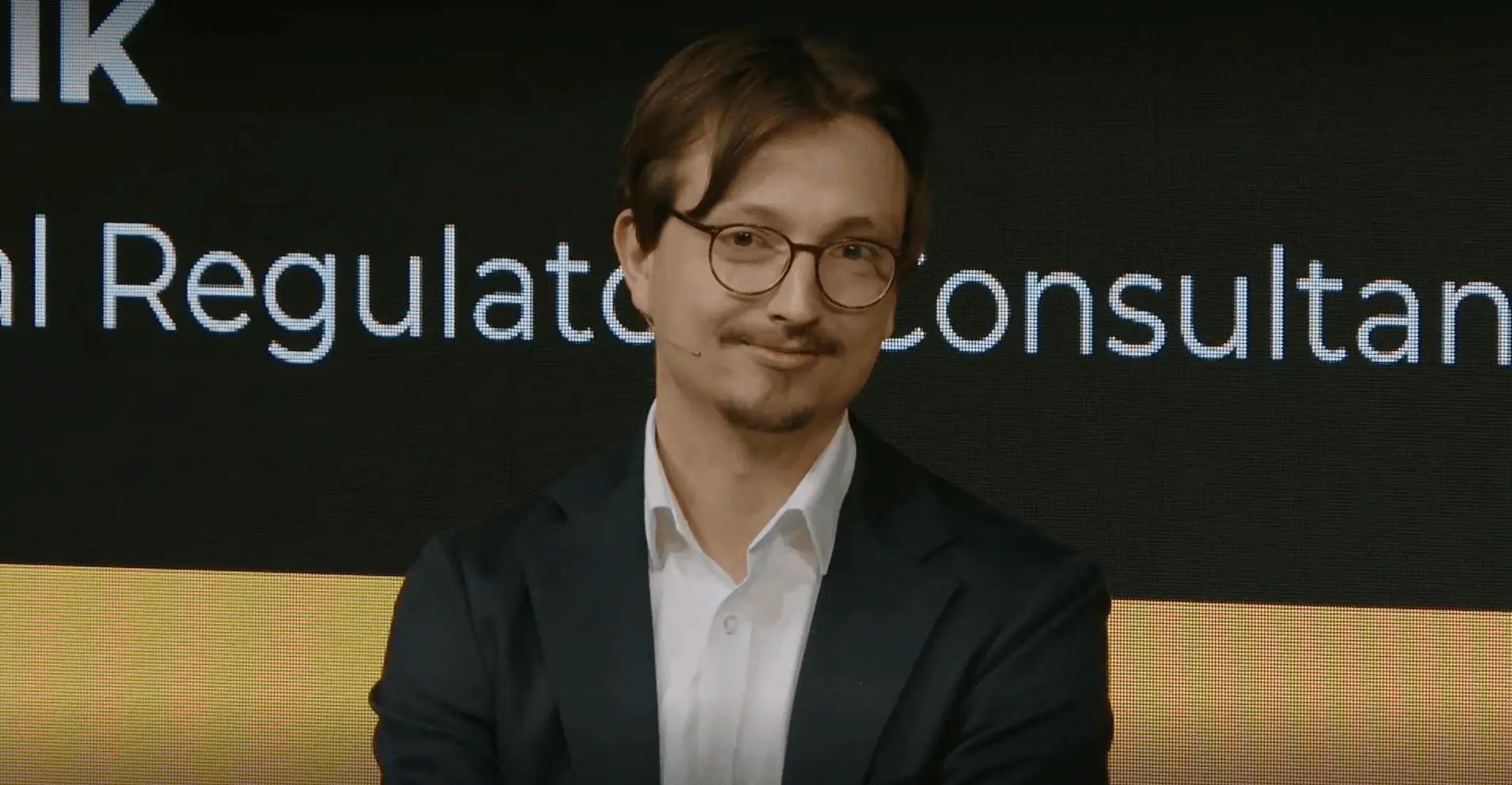
Kromolicki’s goal is to “ensure that the market is involved” in the creation of regulations, hopefully contributing input at the drafting stage. “Our primary mission is fighting misconceptions, to stress that when FTX happens, it’s not because it’s blockchain, it’s because fraud’s a crime.”
Armstrong noted the challenge facing the digital asset sector is “there’s so much jargon that outsiders feel it’s all too complicated.” Kromolicki said groups like Apco “try to translate concerns—very often technical, nitty-gritty level—to the policymakers,” while simultaneously “translating policymakers’ concerns” to the market. Groups like Apco offer a one-stop shop that policymakers can access when trying to glean what the overall market thinks of this or that regulatory proposal.
Let innovation ride!
Last but not least was Hillary Schieve, the mayor of Reno, Nevada. Elected in 2014, Schieve said Reno was at the time still struggling to emerge from the 2008 recession, prompting her to conclude that the city needed to diversify its economy away from casinos and embrace the “risk and innovation” of the technology sector.
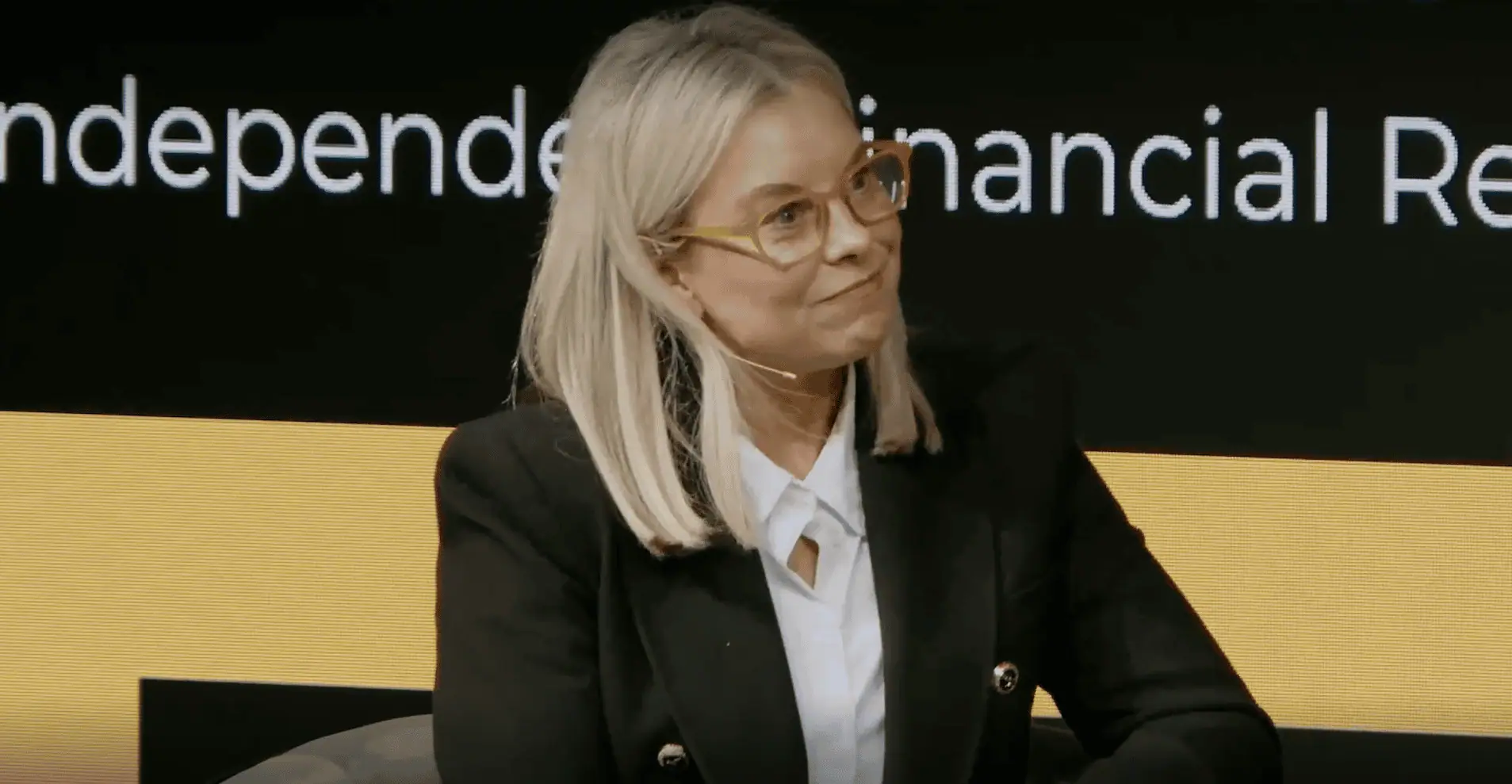
Schieve’s shift eventually attracted firms like Amazon, Tesla and others to build locally, while Schieve organized a non-fungible token (NFT) of the Space Whale, a physical installation originally created for the Burning Man festival. Schieve called the NFT a way for “other people to share the city’s art.” Schieve also put the city’s “historical properties on blockchain so they couldn’t be manipulated” and began compiling staff reports using AI.
Schieve is also the current president of the U.S. Conference of Mayors, and sees part of her role as “introducing this stuff to other mayors.” Her message isn’t always well-received but a recent “test case” involving ChatGPT left many other mayors “mouths dropping to the floor.” Schieve said political rhetoric has left many inured to such messages but the trick was to “go out there and be authentic and honest about expectations.”
Q&A
The panel’s Q&A segment started with Armstrong asking how much fostering innovation was incumbent upon governments. Cairns insisted it had to be a partnership, with the private sector coming up with a plan and convincing the government it’s worthy to go forward, while the government’s responsibility was creating the right regulation. Cairns reiterated “the need to find discrete areas in order to build confidence.”
Kromolicki echoed this view, saying companies need to “show what problems we’re trying to solve with technology rather than show how technology is great and cool and so forth.” Regulators are very pragmatic people and so companies need to “put those use cases up front.”
Schieve said it was no secret that government is “totally antiquated” but urged the private sector to contact her about “your great ideas” because there are “things that I can do to foster your innovation and open those doors.” Spiller commented that he’d “like to get to Reno” to take advantage of Schieve’s collaborative approach.
An audience member asked Cairns what role blockchain could play in improving the UK’s National Health Service (NHS), leading Cairns to reveal that several family members worked in some capacity in the medical field, and they all talked about “the crippling volume of paperwork they have to do.”
Cairns said the combination of blockchain and AI could “free [medical professionals] up for hours of care” but the NHS “is almost like a faith so we have to be cautious about introducing blockchain because we’ve got to have confidence” that it won’t inadvertently make things worse in the short term. Repeating his advice to pick more low-hanging fruit—at least, for the time being—Cairns suggested “we’ve got some baby steps before we get to” fixing the NHS’s well-publicized woes.
Watch: Day One Summary at the London Blockchain Conference 2024
Day Two Highlights at the London Blockchain Conference 2024
Day Three Highlights at the London Blockchain Conference 2024

 07-18-2025
07-18-2025 
